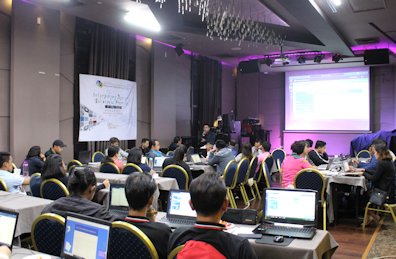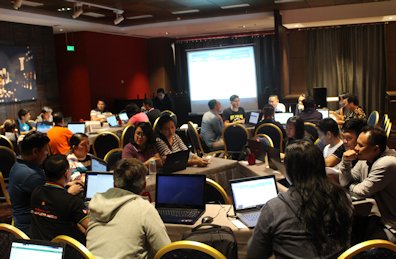The Mines and Geosciences Bureau conducted a Workshop on the Preparation of Information Systems Strategic Plan 2021-2023 on June 17-21, 2019 at Widus Hotel in Clark, Pampanga.
ICT Focal Persons, IT Specialists and Planning Officers from the Central Office and the Regional Offices participated in the said workshop which envisions a fully automated Mines and Geosciences Bureau by the end of year 2023.
The Assistant Director, Atty. Danilo U. Uykieng, welcomed the participants and formally opened the workshop. He underlined the importance of Information and Communications Technology (ICT) and its positive impacts on daily work at MGB. He shared the MGB management’s vision of fully automated and centralized systems. He also shared that the first steps of this vision had already been laid out through the installation of the MGB Network and hiring of IT Specialists for its maintenance in the past years. Further, he asked the participants to know the mining laws and regulations, mandates, processes, procedures, and flowcharts by heart so that they can plan on how to effectively harness the ICT capabilities and incorporate them in the improvement of MGB systems.
To set the tone for the workshop, Ms. Socorro C. Oquendo, OIC-Chief of Planning, Policy and International Affairs Division, presented the key terms relevant to the workshop. She talked about Strategic Planning which is a tool to improve and strengthen operations. She also emphasized the importance of direction, which in our case is compliance with the Data Privacy Act (DPA), Freedom of Information (FOI) and enrollment of our processes in the International Organization for Standardization (ISO). In the same way, she stated that the workshop shall determine the existing systems from the Regional Offices and the Central Office in the hope of establishing closed and continuous loops in the immediate future. A presentation on the approved MGB ICT Budget for FY 2020 followed.
Mr. Jeffrey Ledesma, ICT Officer of Information Systems Group-PPIAD, discussed various MGB ICT Status/Updates. He presented the existing networks in the Bureau namely the MGBNet and LGSDNet and that these two networks will soon be connected as one. He also mentioned current systems in the Central Office such as Central Database, PaPSIS and LegIS which will serve as the logical framework and baseline system for future information systems that will be developed or procured by the Bureau.
Mr. Julius R. Broñoso, Information Systems Analyst II, announced that one of the distinct features of the activity is the fact that it is a paperless workshop. In this regard, he proceeded by introducing Microsoft Teams which is a tool for collaborative work and communication built into one dashboard program. He oriented the participants with an online demonstration followed by actual hands-on activities that highlight Microsoft Teams’ capabilities.

The second day focused on mini workshops of the clustered groups in order to identify existing resources and use it as a baseline for the ISSP regarding systems development and procurement. Some systems that were similar were categorized for future consolidation and collaboration. The clustered groups subsequently received the priority systems identified by the MGB management. They were then tasked to provide proposals for the following priority systems:
- Mining Tenements Document Management System (MTDMS);
- Human Resource Management Information System (HRMIS);
- Document Action Tracking System (DATS);
- Expanded MGB Centralized Database Portal;
- Safety and Health, Environmental and Social Development Management System (SHESDMS);
- MGB Geographic Information System Platform (MGBGIS PLATFORM);
- MGB Frontline Services Automation Project (MGBFSAP);
- MGB Comprehensive Technical Geospatial Program (MGBCTGP); and
- MGB Support Services Automation Project (MGBSSAP).
The groups also identified three development strategies, namely in-house development, out-sourced development and manpower pooling of all IT personnel from the Central Office and the Regional Offices.

With the aforementioned proposals on hand, the groups headed for Day 3 of the workshop which focused on the identification of budget needed for its inclusion and execution in the three-year ISSP for 2021 to 2023. The groups also worked on performance measurement framework. They identified the current inefficiencies of the manual system associated with the proposed priority systems, the objectively verifiable indicators, the baseline data, and targets after the deployment of said systems.
The Planning Officers had a breakout session wherein they discussed the PAPSIS Overview and Review of Challenges and 2019 Targets Updating/Encoding.
The fourth day of the workshop focused on the actual crafting of ISSP for 2021 to 2023 per Central Office Division and Regional Offices. Towards the end of the day, all workshop outputs were presented to the Assistant Director who put forward suggestions, recommendations and expectations.
On the last day of the workshop, an open forum ensued. The commitment to follow through on the proposed system automations was underscored.
